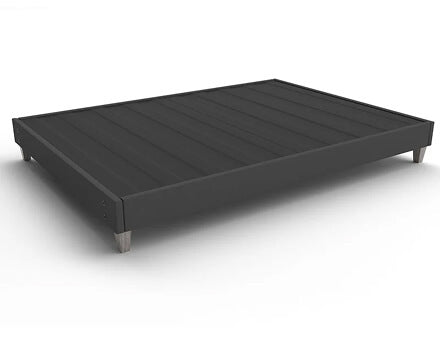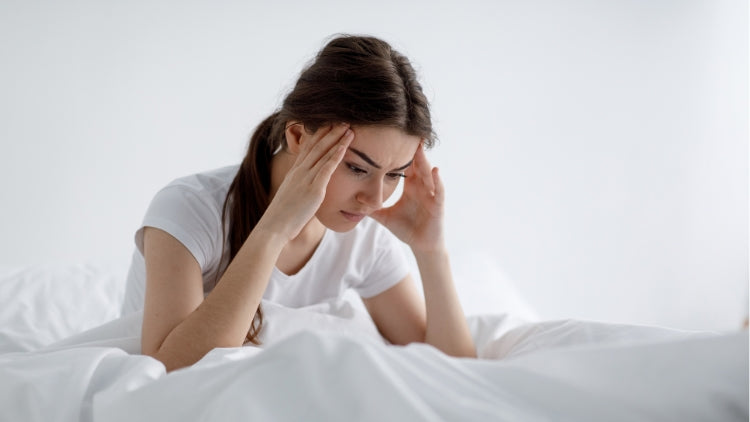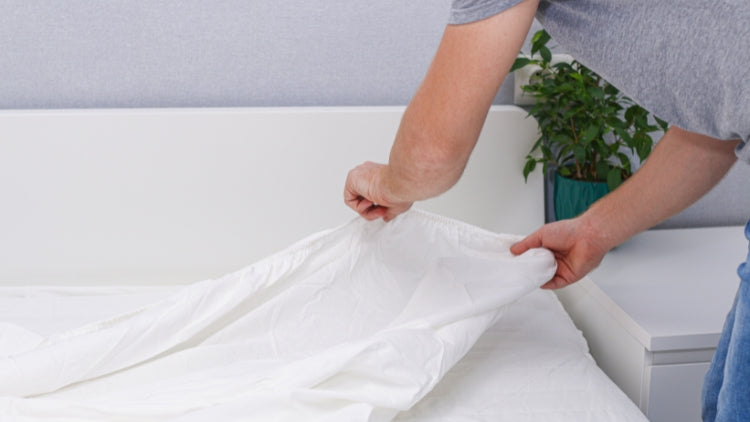Do you often toss and turn at night, unable to fall asleep? You're not alone. Many face the struggle to get a good night's sleep.
About 50 to 70 million Americans have ongoing sleep disorders, with the most common conditions being sleep apnea, insomnia, and narcolepsy. These conditions significantly affect sleep quality.
The National Center for Health Statistics reports that 13.5% of adults over 18 in the United States often feel exhausted. And it's more than just feeling tired the next day; poor sleep can affect your mood, productivity, and overall well-being.
So, what can you do when you can't sleep? In this blog, we've gathered 35 tips from experts to give you practical advice on how to sleep better.
35 Things You Can Do To Fall Asleep According To Experts
1. Lower the room's temperature.
Making sure your bedroom maintains an ideal temperature is essential for promoting sleep. Research suggests that a colder environment, typically between 60-67°F (15-19°C), can promote better sleep quality.
When your body temperature drops slightly, it signals your brain that it's time to sleep. So, consider adjusting your thermostat or using fans to create a comfortable, cool atmosphere in your bedroom.
2. Make the perfect sleeping spot.
Your bedroom should be a sanctuary dedicated to sleep. To achieve this, focus on making it cool, dark, and quiet.
Investing in high-quality sheets and pillows can enhance comfort and support, while blackout curtains can block out any light that might disturb your sleep. Moreover, you can use earplugs or a white noise machine to minimize unwanted noise.
3. Upgrade your mattress.
An old or uncomfortable mattress can negatively impact sleep quality by causing discomfort and disrupting sleep.
If yours shows signs of lack of proper support or wear and tear, consider investing in a new mattress. Look for one that aligns with your comfort preferences and sleep requirements.
4. Following a breathing technique: inhale for 4 seconds, hold for 7, then exhale for 8.
This breathing technique, introduced by Dr. Andrew Weil, is simple yet powerful for relaxing and quieting the mind before sleep.
Inhale deeply for four (4) seconds, hold for seven (7) seconds, and then exhale for eight (8) seconds. This sequence triggers your body's relaxation response, making it easier to fall asleep.
5. Have a set time to sleep and wake up.
Consistency is vital in regulating your sleep-wake cycle. Establishing a fixed bedtime and wake-up time—even on weekends—helps synchronize your body's internal clock. It makes falling asleep easier and makes waking up feel refreshed.
6. Experience both daylight and darkness.
Exposure to natural light in the day helps regulate your circadian rhythm. Spending time outdoors during daylight hours signals your body that it's daytime. Conversely, ensure your bedroom is dark at night to promote melatonin production, the hormone that regulates sleep.
7. Do yoga, think calmly, and pay attention.
Incorporating relaxation techniques like yoga, meditation, and mindfulness into your bedtime routine can help. These practices calm the mind, reduce stress, and prepare your body for sleep.
8. Don't look at your clock.
Looking at the minutes tick by can worsen feelings of anxiety and frustration when you're struggling to fall asleep. Instead, turn your clock away from you or place it out of sight to prevent yourself from focusing on the time.
9. Don't take naps in the daytime.
While a short nap can boost energy, excessive daytime napping disrupts sleep. If you need to nap, limit it to at least 30 minutes earlier in the day so you won't have a hard time sleeping.
10. Watch what you eat and when you eat.
Maintaining a balanced diet and eating regular meals can positively affect your sleep.
Avoid consuming heavy or spicy foods near bedtime, as they can disrupt sleep. Eating within two hours before bed is associated with later bedtimes, difficulty falling and staying asleep, and obesity.
Instead, opt for light, easily digestible snacks if you need a pre-bedtime snack.
11. Listen to calming music.
Listening to relaxing music before sleeping can calm the mind and promote relaxation. Consider creating a calming playlist or exploring ASMR (Autonomous Sensory Meridian Response) content. It is known for its tendency to induce feelings of relaxation and sleepiness.
12. Exercise enough (at the appropriate times).
Regular physical activity benefits overall health and can improve sleep quality. Moderate daily exercise helps reduce stress, tire out your body, and promote deeper sleep. However, avoid vigorous exercise when you're about to sleep, as it may have the opposite effect.
13. Get cozy.
Comfortable sleep surroundings are essential for getting quality rest. Ensure your mattress and pillows adequately support your body and are free from lumps or sagging.
Wear loose-fitting, breathable pajamas that allow unrestricted movement and airflow, promoting a more restful sleep experience.
14. Turn off all gadgets.
Electronic devices like smartphones, computers, and tablets emit blue light, suppressing melatonin production. As a result, your body's natural sleep-wake cycle is disrupted.
Did you know that 50% of people who watch TV before bed get less than seven hours of sleep? Turn off all electronic devices at least an hour before sleeping to improve sleep quality. Instead, engage in calming activities like listening to calm music or reading.
15. Try Aromatherapy.
Aromatherapy involves using essential oils to promote improved sleep quality. Scents like lavender, chamomile, and cedarwood have calming properties that can reduce anxiety and stress. As a result, it becomes easier to feel drowsy and stay asleep throughout the night.
16. Write before you sleep.
Journaling before bed is a therapeutic practice. It clears your mind of worries and stressors, helping you relax and unwind before sleep.
Spend a few minutes jotting down your thoughts, feelings, or things you're grateful for to promote a sense of calm and mental clarity.
17. Don't have too much caffeine.
Caffeine disrupts sleep by blocking the effects of adenosine, a neurotransmitter that promotes calmness and drowsiness. To avoid disrupting your sleep, limit caffeine intake, especially in the afternoon and evening. You can choose caffeine-free alternatives like herbal tea before bed.
18. Change your sleep position.
Finding a comfortable sleep position is crucial for getting quality rest. Try different sleeping positions, such as on your back, side, or stomach. See which gives you the most support and relieves discomfort or pain. Changing your position will help you sleep better at night.
19. Read a book.
Reading a physical book before bed is a relaxing way to unwind and prepare your mind for sleep. Choose reading material that is engaging but not overly stimulating, as this can help distract your mind from racing thoughts or worries, making it easier to transition into a restful slumber.
20. Try to stay awake on purpose.
Trying to stay awake helps you fall asleep faster. This technique, known as paradoxical intention, involves deliberately staying awake while lying in bed. By removing the pressure to fall asleep, sleep comes more naturally.
21. Imagine happy things.
Positive visualization before bed can help calm your mind and promote relaxation, making it easier to fall asleep.
Imagine yourself in a peaceful setting like a tranquil beach or lush forest. Focus on the sounds, sights, and sensations around you. Thinking about happy scenarios helps create a sense of tranquility and well-being.
22. Try sleep-enhancing supplements.

Certain supplements, such as melatonin and magnesium, promote relaxation and improve sleep quality. However, consulting a healthcare professional before taking any supplements is essential. The supplements may interact with other medications or cause side effects.
23. Fix any health problems first.
Addressing any underlying health issues should be a top priority if you're struggling with sleeplessness.
Your body's ability to achieve restful sleep can be significantly compromised by various health conditions, ranging from chronic pain to sleep disorders like sleep apnea or insomnia.
24. Keep track of your sleep.
Keeping a sleep diary can give insights into your sleep patterns and habits, helping you identify factors contributing to your sleep difficulties.
You can record information such as bedtime, wake-up time, sleep duration, and any significant events or disturbances during the night. This practice will help pinpoint areas for improvement.
25. Don't sleep in to make up for lost sleep.
Sleeping in on weekends can be tempting to compensate for lost sleep during the week. However, it can disrupt your sleep-wake cycle and make it harder to fall asleep. Instead, maintain a consistent sleep schedule, even on weekends, to support healthy sleep habits.
26. Keep to your natural sleep cycle.
Syncing your sleep schedule with your natural circadian rhythm can optimize sleep quality. It also promotes overall well-being. Try to go to bed and wake up at the same time each day, even on weekends, to reinforce your body's internal clock and improve sleep consistency.
27. Don't drink alcohol before sleeping.
While alcohol may make you feel sleepy, it can disturb sleep patterns and lead to fragmented, poor-quality sleep later in the night. To promote better sleep, avoid consuming alcohol close to bedtime and opt for non-alcoholic beverages instead.
28. Bathe or shower in the evening.
A survey reveals that 58% of adults who shower or bathe before bed say it helps them sleep.
A warm shower or bath before sleeping helps relax muscles and signal to the body that it's time to prepare for sleep. Additionally, decreased body temperature after a warm bath or shower can induce sleepiness, making it easier to fall asleep.
29. Try a special milk drink: Golden Milk.
Golden milk is a warm drink consisting of turmeric, milk, and other spices. It has been used for centuries in Ayurvedic medicine. This drink promotes relaxation and improves sleep quality.
The combination of ingredients, including turmeric's anti-inflammatory properties and warming spices like cinnamon and ginger, can help soothe the body and mind, making it easier to drift off to sleep.
30. Wear a sleep mask.
Using a sleep mask blocks out light, creating a dark surrounding. This promotes deeper and more restful sleep. Choose a comfortable, adjustable sleep mask that fits snugly over your eyes without putting pressure on them, allowing you to sleep undisturbed by light.
31. Try a weighted blanket.
Weighted blankets provide gentle pressure across your body, known as deep touch pressure, which can help promote relaxation and reduce anxiety. This sensation mimics the feeling of being hugged. It fosters a sense of security and calm, allowing you to quickly doze off and enjoy a more restful night's sleep.
32. Wear the right clothes for sleep.
Choosing the right sleepwear can contribute to your overall comfort and sleep quality. Opt for loose-fitting pajamas made from breathable, natural fabrics like bamboo or cotton to help control your body temperature and avoid overheating at night. Avoid fabrics that trap heat or feel constricting because they can disturb your sleep by causing discomfort.
33. Relax your muscles one by one (Progressive relaxation techniques).
Progressive relaxation involves tensing and relaxing various muscle groups in your body, one at a time. It promotes physical relaxation and reduces tension.
Begin by tensing a specific muscle group, then release the stress and allow the muscles to relax completely. Repeat this process for each muscle group in your body, working your way from head to toe, to induce deep relaxation to help you fall asleep more easily.
34. Decide if your pet can sleep with you or not.
While many people enjoy the companionship of their pets at night, allowing them to sleep in your bed can sometimes disrupt your sleep.
If your pet's presence in bed is causing disturbances, consider moving them to their sleeping area. Alternatively, establish boundaries by designating specific areas of the bed where your pet can sleep. This boundary will ensure that you and your furry friend can rest peacefully throughout the night.
35. Get a massage on your face or head.

A gentle face or scalp massage can ease tension and promote relaxation. It makes it easier to unwind and fall asleep.
Use your fingertips to apply gentle pressure to your forehead, temples, and scalp, using circular motions to massage away any stress or tension accumulated throughout the day. Focus on areas where you feel tightness or discomfort. Adjust the pressure to suit your preferences and promote a sense of calm that can help you sleep faster.
Sleep Better Tonight With These Expert Tips
Achieving a good night's sleep is crucial for your overall health and well-being, and implementing these 35 expert-backed tips can improve your sleep quality.
Remember, creating a conducive sleep environment is essential. Investing in high-quality sheets and pillows can improve your comfort and ability to rest well.
By prioritizing your sleep and consistently practicing these tips, you can transform your nightly routine and wake up refreshed and ready to take on the day.
FAQs
What causes difficulty in sleeping?
Different factors like stress, anxiety, bad sleep habits, medical conditions, or lifestyle choices can make sleeping hard.
What should I do if I wake up in the middle of the night and can't get back to sleep?
If you can't fall back asleep within 20 minutes, get out of bed and do a peaceful activity until you feel sleepy. Avoid looking at screens.
What is the best sleep position?
Sleeping on your back or side is generally better for your spine and overall sleep quality. Don't sleep on your stomach as much as possible, as it can cause neck and back pain.


















Leave a comment
This site is protected by hCaptcha and the hCaptcha Privacy Policy and Terms of Service apply.